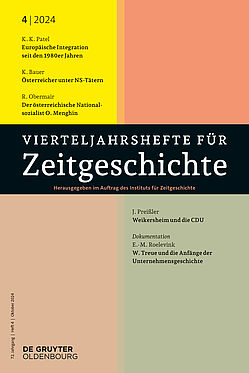- The Institute
- Research
- Dictatorships in the 20th Century
- Democracies and their Historical Self-Perceptions
- Transformations in Most Recent History
- International and Transnational Relations
- Edited Source Collections
- Dissertation Projects
- Completed Projects
- Dokumentation Obersalzberg
- Center for Holocaust Studies
- Berlin Center for Cold War Studies
- Publications
- Vierteljahrshefte
- The Archives
- Library
- Center for Holocaust Studies
- News
- Dates
- Press
- Recent Publications
- News from the Institute
- Topics
- Reordering Yugoslavia, Rethinking Europe
- Munich 1972
- Confronting Decline
- Digital Contemporary History
- Transportation in Germany
- German Federal Chancellery
- Democratic Culture and the Nazi Past
- The History of the Treuhandanstalt
- Foreign Policy Documentation (AAPD)
- Dokumentation Obersalzberg
- Hitler, Mein Kampf. A Critical Edition
- "Man hört, man spricht"
- IfZ
- Vierteljahrshefte
- VfZ Archive
- Issue Index
- 2024
- Issue October 2024
Issue 4/2024
Content Overview: English Titles and Abstracts:
- Kiran Klaus Patel, Transformation on the Rocks. On the History of European Integration since the 1980s - a deeper look into the issue
- Kurt Bauer, Were Austrians Overrepresented among National Socialist Perpetrators? An Attempt at Synthesis
- Robert Obermair, Between Politics and Academia. The Second Life of the Austrian National Socialist Oswald Menghin
- Josefine Preißler, “A Thorn in the Flesh of the Christian Democrats”. Hans Filbinger, Günter Rohrmoser, and the Studienzentrum Weikersheim, 1979 to 1985
- Eva-Maria Roelevink, Wilhelm Treue and the Genesis of the “Geschichtliche Darstellung der Gewerblichen Wirtschaft”
Abstracts
Kiran Klaus Patel, Transformation on the Rocks. On the History of European Integration since the 1980s
In this article, the Kir royal, a fashionable drink of the 1980s, serves as a starting point to probe central problems of the history of today’s European Union over the last four decades. Kiran Klaus Patel argues that shortly before the end of the Cold War a transformation of the unification process had already begun. Against this background, the author develops a multi-perspective research agenda which in particular aims to link the history of integration more closely with general questions of European contemporary history. Moving beyond teleological and triumphalist blueprints, the article thus also contributes to a genealogy of current problems.
Kurt Bauer, Were Austrians Overrepresented among National Socialist Perpetrators? An Attempt at Synthesis
In 1966, Simon Wiesenthal addressed a memorandum to the Austrian federal government. In this paper, he claimed – admittedly without empirical evidence – that Austrians had been strongly overrepresented among Nazi perpetrators. Wiesenthal’s aim was to intensify efforts to prosecute incriminated persons in Austria. While he did not succeed in his endeavor, his thesis of Austrian overrepresentation prevailed in academia and journalism and became a recurring theme in both specialist literature and popular historical depictions. In this article, Kurt Bauer examines and evaluates the validity of this statement by analyzing various groups of perpetrators and criminal complexes. He concludes that the proportion of Austrians among Nazi perpetrators roughly corresponded to the share of population of the so-called Ostmark within the German Reich.
Robert Obermair, Between Politics and Academia. The Second Life of the Austrian National Socialist Oswald Menghin
Robert Obermair examines the escape of the Austrian National Socialist Oswald Menghin to South America and his integration in Argentina. In particular, he focuses on Menghin’s second career as a researcher in Buenos Aires. In this context, the author also looks at the process of denazification of academia in Austria and investigates how the treatment of this researcher by the Austrian authorities, who initially issued a police arrest warrant, as well as his networks in the political and academic milieus in Europe affected his second career in South America. The example of Oswald Menghin is used to discuss the transnational links between politics and research in the postwar period.
Josefine Preißler, “A Thorn in the Flesh of the Christian Democrats”. Hans Filbinger, Günter Rohrmoser, and the Studienzentrum Weikersheim, 1979 to 1985
The Studienzentrum Weikersheim (SZW – Weikersheim Study Center) has largely been forgotten today, although it was an important source of inspiration in the political discourse surrounding the so-called geistig-moralische Wende (intellectual and moral turning point). Founded in 1979 on the initiative of Hans Filbinger and Günter Rohrmoser, the SZW saw itself as a “thorn in the flesh of the Christian Democrats”, for whom it wanted to provide new impetuses in conservative thought. Largely based on newly available sources, Josefine Preißler traces the founding and development of the Study Center up to 1985. She elaborates why its ideas largely failed to find their way into the policies of the Christian Democrat-Liberal coalition government under Helmut Kohl and to what extent this moment of disappointment led to the radicalization of the SZW, which from then on acted as a central player in the “spectrum bridging conservatism and right-wing extremism” (Armin Pfahl-Traughber).
Eva-Maria Roelevink, Wilhelm Treue and the Genesis of the “Geschichtliche Darstellung der Gewerblichen Wirtschaft”
The historian Wilhelm Treue (1909–1992) is considered a central figure in the establishment of West German corporate history after the Second World War. By analyzing original sources, Eva-Maria Roelevink seeks to expand our understanding, particularly for the period before 1945, which was previously limited to Treue’s publications. She thus shows that his allegedly fractured career path was vital for his conception of a modern corporate history. Treue was forced to switch from a university career to official military historiography; from there he developed his later concept and established the networks in the economic sector from which he profited considerably after 1945.








